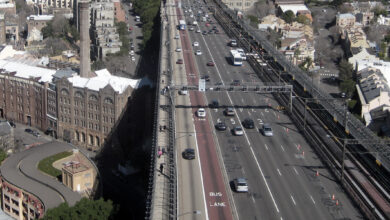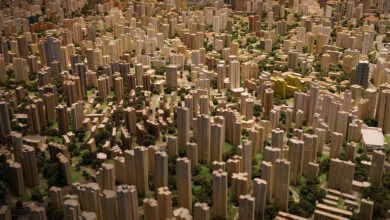![Tim Flannery at the 2014 People's Climate March. September 2019: "[I] look back on my 20 years of climate activism as a colossal failure." Photo:Peter Campbell](https://www.foreground.com.au/app/uploads/2019/09/1280px-2014-09-21_tim_flannery2.jpg)
Foreground Weekly Review: emergency response
As organisations around the world declare a climate emergency, the urgent next question is what that means for action. Greta Thunburg tell the US Congress it’s not trying hard enough. Tim Flannery says it’s time for rebellion, and The Conversation adopts zero-tolerance toward climate denialists.
This article is part of Foreground’s 2 Degrees themed series of essays
This Friday school children and many others around the world will strike to raise awareness and demand action on climate change. The week has seen increasing calls for clear responses to an evident problem, rather than agreements on that problem. So are declarations really responding to climate change as an emergency, an imminent threat demanding unequivocal commitment and action?
Collective acknowledgement of climate change is core to the various declarations being made by governments, peak bodies and representative organisations globally. Many declarations also articulate a range of commitments to tackle both the causes and effects of rising CO2. But are these commitments bold enough? Are they specific enough and will they compel compliance? The City of Adelaide has “joined 36 councils across Australia and more than 900 worldwide to declare that climate change should be treated as a national emergency” yet has been slammed by many for approving the removal of mature trees along North Terrace as part of the Lot14 development.
When Greta Thunberg and other young climate activists met with the US Senate climate crisis task force on Tuesday, they were asked how Congress might combat climate change. “If you want advice for what you should do, invite scientists, ask scientists for their expertise. We don’t want to be heard. We want the science to be heard,” responded Greta. “Please save your praise. We don’t want it,” she said. “Don’t invite us here to just tell us how inspiring we are without actually doing anything about it because it doesn’t lead to anything.”
Landscape architecture responds
On 16 September, the International Federation of Landscape Architects (IFLA) declared a Climate and Biodiversity Emergency at the IFLA World Congress in Oslo, Norway. This has followed a declaration of the same title by the Australian Institute of Landscape Architects (AILA) in August. This, in turn, had followed release of an AILA Green Infrastructure Position Statement which reiterated the importance of green infrastructure in addressing both CO2 emissions as a cause of climate change, as well as green infrastructure’s value in mitigating the effects of climate change. In publishing the recent declaration, national president Shaun Walsh admitted that we “need to take an immediate and proactive look at what else we can do” and that the community was “up to the challenge of working with governments and the community to take immediate action.”
While the eight points in last month’s AILA declaration outline the necessary commitments that will eventually lead to actions addressing climate change, they predominantly concern pre-conditions for such direct action. The points acknowledge that landscape architects have been working to raise awareness of climate change for some time, and suggest that they should indeed continue to lead responses and continue to lobby for recognition of the crisis. Only one of the eight points is not a call to – in various valuable but generic ways – develop and promote actions rather than take action. Point six offers a disciplinary-specific suggestion for an action close to having a direct impact on CO2 emissions: “Lobbying for improved industry standards and practice.”
While IFLA commits to “a significant, long-term shift in thinking, behavior, policy” it also outlines six points for a two-year ClimateACTION! Plan. Yet, similarly to AILA’s declaration, the majority of the six points are at a deflating remove from actions that could influence climate change effectively. One point similarly seeks to partner with suppliers to improve industry standards and practice. Another importantly aims to update ethical standards and codes of conduct to align with the UN Sustainable Development Goals. Disciplinary influence could be significant if the profession committed to review – and condemn as unethical – engagement with projects, materials or processes known to contribute significantly to climate change. Point five calls for reducing landscape architects’ individual carbon footprints through changes in building materials, design practice, travel and operations. Because it appeals directly to members, this one point might be enacted immediately.
Tim Flannery’s message this week reflected on the “breathtaking” disconnect of Australia’s political leaders from the deadly nature of fossil fuels. “No climate report or warning, no political agreement nor technological innovation has altered the ever-upward trajectory of the pollution,” notes Flannery. “This simple fact forces me to look back on my 20 years of climate activism as a colossal failure.” While science has continued to refine its work in an atmosphere of increasing hostility, effective action remains at an impasse.
Flannery has tolerated the pronouncements of climate change deniers “as the utterings of idiots — in the true, original Greek meaning of the word as one interested only in their own business,” but now believes their clearly predatory actions can no longer be tolerated. In acknowledgement of the necessity of exactly such a decisive stand, The Conversation has announced that “climate change deniers are dangerous – they don’t deserve a place on our site”.
Reform or rebellion?
Is it still possible to reform current systems of production, distribution and governance to reduce CO2 emissions? Friday’s climate strike has the support of many employers, including tech companies, university administrations and even the big four banks. This may be a sign that business interests recognise that climate change literally means that they cannot continue business as usual. The Insurance Council of Australia issued a statement in June accepting the international scientific consensus presented by the Intergovernmental Panel on Climate Change and supported by the CSIRO. It recognises that climate change “is occurring along a rapid and severe pathway”. Governments too are advising business of needs for risk management from climate change. There is, however, also a growing acknowledgement that changing weather will make some of the world uninsurable, perhaps most of it.
Already heavily – and arguably unsustainably – subsidised, coal is on the road to becoming completely uninsurable. Many projects will need to be rethought or will never come to pass. Should built environment professionals wait for the market to determine this and trust in an equitable shift in city building priorities? Can they work with reform?
On the other hand, such ready support for a wide-ranging strike might be said to barely cause an inconvenience. It’s symbolic power may well comfort rather than shift any present entrenched systems. It is commonplace to find striking workers apologise for any inconvenience but disruption is the point and the leverage for change. It may be that only collective intolerance for the failings of those in power will create conditions for the urgent changes that are needed. It is an emergency.
–
Foreground reads: our pick from around the web on the climate emergency
IFLA declares a climate and biodiversity emergency
The International Federation of Landscape Architects (IFLA) has declared a Climate and Biodiversity Emergency at the IFLA World Congress in Oslo, Norway. The move comes following the unanimous support of the 77 voting nations and it maps out an action plan of what IFLA will do in response to the issues the globe is facing.
Greta Thunberg to Congress: ‘You’re not trying hard enough. Sorry’
At a meeting of the Senate climate crisis task force on Tuesday, lawmakers praised a group of young activists for their leadership, their gumption and their display of wisdom far beyond their years. They then asked the teens for advice on how Congress might combat one of the most urgent and politically contentious threats confronting world leaders: climate change.
The gloves are off: ‘predatory’ climate deniers are a threat to our children
In this age of rapidly melting glaciers, terrifying megafires and ever more puissant hurricanes, of acidifying and rising oceans, it is hard to believe that any further prod to climate action is needed. But the reality is that we continue to live in a business-as-usual world.
Climate change deniers are dangerous – they don’t deserve a place on our site
At The Conversation Australia we’ve recently vowed to improve our climate change coverage, and part of that means moderating comments with a similar degree of rigour. Once upon a time, we might have viewed climate sceptics as merely frustrating. We relied on other commenters and authors to rebut sceptics and deniers, which often lead to endless back and forth. But it’s 2019, and now we know better.
This article is part of Foreground’s 2 Degrees themed series of essays


